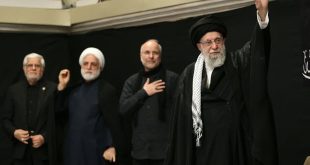If you ask yourselves and ask all those whom you know, that is, the Sunnis and some of the learned (Sunni religious scholars) – the very people who are expert in the science of traditions, if you ask them to what extent this tradition “I left behind for you something that if you resort to, you will never go astray: the KitabAllah and Sunnati” is genuine, they will answer, “this tradition is definitely a repeatedly stated one and there is no doubt in its genuineness”. Concerning its chain of transmission, this tradition is certainly as definite as the Holy Qurʹān. There is almost no sermon and pulpit in which this tradition is not mentioned. “…the book of God and my practice”.
Does this tradition really exist in Ṣaḥīḥayn (Ṣaḥīḥ Muslim and Ṣaḥīḥ Bukhārī)? They say, “It definitely exists in Saḥīḥayn and it has been repeatedly stated in masānīd (the Sunni reliable books on traditions) and in all Sunni books where traditions have been collected”.
Not at all! This is a weak tradition. It exists in no one’s book. Not in Bukhārī’s, Muslim’s, or Abū Dāwūd’s. No one has mentioned it in his book; not Nessāī, Tirmidhi, or Ibn Mājah. Not even one of the authors of Kutub al-Sittah or the six books (books containing collections of traditions compiled by six Sunni scholars) has mentioned this tradition in his book.
Now you are shocked and amazed at my words. You would ask in surprise, “What are you saying?”
This tradition, “…the book of God and my practice” does not exist in any of our six books. Yes, it does not exist in any of our six books. Mālik has cited it without its chain of transmission. He states, “I have come to know that the Prophet said, ‘I leave behind for you…’”. He writes, “I have come to know…” without mentioning the tradition’s chain of transmission.
Other authors have also brought this tradition in their books as a loose one, such as Ṭabarī in his book titled Tārīkh al-Rusul wa al-Mulūk (History of the Prophets and Kings). There are also some authors who have cited a chain of transmission for this tradition, but the chain is questionable. Some have tried hard to make the chain of transmission of this tradition genuine, but the genuineness of the chain is questionable.
However, the genuine tradition that exists in Ṣaḥīḥ Muslim, Musnad Aḥmad, Mustadrak Hākim Neyshabūrī and in tens of other books which according to Muslim and Bukhārī, have reliable chains of transmission, and whose existence in Ṣaḥīḥ Muslim is enough to prove its genuineness is this: “I left behind for you something that if you resort to, you will never go astray; they are the book of God and my family, that is, my descendants”.
This is what we, as Sunnis, do not hear, and if we hear it, we say it is a Shia tradition and it is for the Shia. Yes, the tradition is like this in the Shia’s books, but we Sunnis also have this very tradition in our sound and reliable books.
Why is it that we do not talk of this tradition?
It is so because Banī ʹUmayya’s conspiracy against the Prophet’s family has continued up to the present time. Pay attention!! This is what shocks a man and makes him hesitate. It gives him a terrible shock and makes him afflicted and ashamed.
How?? How have we gotten used to citing a tradition that is not genuine? We cite it all the time and every time, day and night, in every meeting and gathering, in every sermon and admonition though it cannot be genuine save after much hesitation.
And how have we gotten used to turning away from citing the genuine tradition, the tradition transmitted from Zayd ibn Arqam in Ṣaḥīḥ Muslim and from Abū Saʻīd Khudrī (May God be pleased with them).
“… the book of God and my family”. Muḥammad Nāsir-ud-Dīn al-Albāni is also one of those scholars who have confirmed its genuineness in a way different from Muslim’s. “…the book of God and my family”.
But Banī ʹUmayya do not like this tradition, my brothers. Now that they do not like it, the Prophet must keep silent, and he stayed silent.
For us, that is for the Sunnis, the Prophet has kept silent for 1400 years.
We do not hear this tradition and when we hear it, it smells immediately of Shia Islam.
My brothers, this is Muḥammad (Peace upon him)’s tradition. This is Muḥammad (Peace upon him)’s tradition no matter who would hate it or like it.
Oh God! Let us be of those who are pleased with this fact.
This is a strange thing, brothers.
 Ijtihad Network Being Wise and Faithful Muslim in the Contemporary World
Ijtihad Network Being Wise and Faithful Muslim in the Contemporary World
